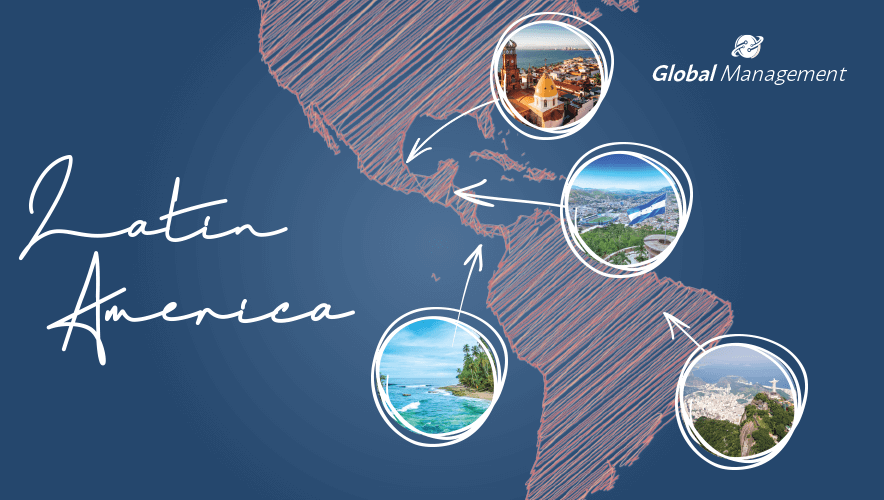Global Management: How Security is Changing in Latin America
Security management is a global profession. Every region of the world has threats that need mitigation; every organization has people and assets that need protection. But the practice of the profession is also influenced by local conditions—culture, business practices, economics, politics, and type and severity of threats—that differ from region to region.
With that in mind, this ongoing Global Management series from Security Management highlights security managers from different regions of the world to learn about the challenges they face and the management strategies that help them succeed.
In this installment, we turn to Latin America. While each region, country, and state has unique challenges and cultures, security professionals are facing broad risks from evolving criminal activity and subsequent economic instability. Changing elements in the workplace—from certification-focused hiring managers, a younger workforce demanding respect and inclusion, and the influence of digital transformation—have driven security professionals to build robust local networks and pursue more proactive business and security strategies.
These conversations have been lightly edited for length and clarity.
 Lourdes Morales Aguilar is prevention tribe lead for Walmart Mexico and Central America. A Costa Rican criminologist with more than 16 years of experience in the security field, she is responsible for corporate security, emergency management and response, executive protection, investigations, security operations, and supply chain security. Aguilar describes herself as a disruptive, adaptable, and curious security professional, which enables her to challenge cyclical security processes and develop tailored security solutions.
Lourdes Morales Aguilar is prevention tribe lead for Walmart Mexico and Central America. A Costa Rican criminologist with more than 16 years of experience in the security field, she is responsible for corporate security, emergency management and response, executive protection, investigations, security operations, and supply chain security. Aguilar describes herself as a disruptive, adaptable, and curious security professional, which enables her to challenge cyclical security processes and develop tailored security solutions.
What are a few of the common challenges that a security manager may face working in Mexico?
LA. Crime and resulting insecurity are some of the most serious problems that Mexico has faced in recent decades. According to the National Victimization Survey 2020 (ENVIPE), during 2019, 29.2 percent of the country’s homes had at least one crime victim. The same survey indicated that in 2019 there were 30.3 million crimes associated with 22.3 million victims in the country, which represents a rate of 24,849 victims per 100,000 residents during that period.
ENVIPE pointed out that 68.2 percent of the population over 18 years of age said public insecurity is the main problem afflicting Mexico, followed by unemployment (34.6 percent), and health (with 36.2 percent). Similarly, 78.6 percent of the population said that living in their state is unsafe because of crime.
Speaking about crime, unemployment and poverty always emerge as determining factors. In turn, crime also causes greater poverty—creating a vicious circle that is difficult to break.
In just one year, the impact of the coronavirus pandemic on the Mexican economy has been catastrophic. The gross domestic product (GDP) had its worst fall in almost a century, plummeting 8.5 percent in 2020, which in turn caused thousands of Mexicans to lose their jobs. Mexican economists estimate that the pandemic will cause nearly 12 million people to fall into poverty, which would affect almost 26 percent of the population.
In your view, is the relationship between manager and employee changing in Latin America? How does workplace culture today compare with years past?
LA. The introduction of flexible ways of working has taken a significant leap during the COVID-19 pandemic. Companies have accelerated their digitalization processes at full throttle to adapt, first to confinement measures and now to design what the new environments will be like.
In recent months, companies have been able to verify that teleworking has favored work for objectives over work for dedicated hours, that employees greatly value this flexibility, and that technology can support the demand for remote connection, allowing practically all types of operations. Everything indicates that teleworking and labor flexibility will be the levers of the new labor reality.
Also, many companies have realized that maintaining sustainable business performance requires the ability to attract and retain a diverse workforce.
Diversity and inclusion mean that all individuals have equal opportunities, regardless of their ethnic group, country of origin, sexual orientation, race, ability, gender, age, or even personal interests. It is not just about job opportunities—it is about people feeling safe as who they are, and that their different experiences, values, and perspectives are appreciated, rather than something that could harm them.
Given your experience as a business leader, do you see the role of the security department changing with some Mexican or Costa Rican companies?
LA. Risks, threats, and crises have become more complex and sophisticated; with this came the need to anticipate them through the application of preventive measures and the use of data. But this does not exempt companies with a greater size, complexity, or geographic presence from continuing to face crisis situations that require an immediate response.
In crisis management, the speed of response is essential—driving an accurate diagnosis of the threat and the implementation of an immediate action plan with the necessary resources to carry it out. And both the diagnosis and the action plan must be comprehensive and deal with all those aspects—operational, communication, legal, technological, or financial—that allow a rapid recovery of the company’s situation.
Prevention and reaction must be in perfect balance to guarantee the success of security teams.
 Servio Camey, CPP, is regional security manager for Central America and the Caribbean for Bayer. He is responsible for physical security, strategic security, intelligence for early risk or threat detection, brand protection, managing anticounterfeit or contraband investigations in the region, logistics security, and ensuring the quality of products and a safe working environment for employees. Camey is based in Guatemala.
Servio Camey, CPP, is regional security manager for Central America and the Caribbean for Bayer. He is responsible for physical security, strategic security, intelligence for early risk or threat detection, brand protection, managing anticounterfeit or contraband investigations in the region, logistics security, and ensuring the quality of products and a safe working environment for employees. Camey is based in Guatemala.
What are a few of the common challenges that a security manager may face working in Central America?
SC. Central America has to be divided in two areas—one is from Nicaragua to Panama, and the other is the northern triangle of Guatemala, El Salvador, and Honduras. This is the biggest challenge of all because these countries are the birthplace of gangs and extortion, and any security manager in the region has to be very well versed in handling extortion, kidnap, and negotiations. Constant training, preventive security, and risk analysis are essential when working in countries that are in the top 20 most violent countries in the world. But I have learned that due diligence in all we do will keep you with zero incidents if you have a consolidated team that has good cohesion, global policies, and local procedures in place.
Another challenge is social disruptions; the region is volatile in social activity. We have seen Nicaraguans block roads for 20 days in which all raw materials or products have been halted—nothing could pass either way, and millions of perishables were lost. Honduras has also seen social violence. In one incident, a banana company lost more than 20 containers burned down by protesters in one day. Costa Rica has blocked its border with Panama due to feuds with trucker unions, so having good intelligence, crisis management, and business continuity plans is vital in the region.

And last, corruption is present mostly from Guatemala to Nicaragua and in way lesser quantity in Costa Rica and Panama. A good security manager in the region has a compendium of laws for the six countries, as well as contacts to tend to logistic emergency response in case of accidents or loss in transit. Managing a region as complex as Central America tests your skills and brings the best out in every security department—the key to win is the application of best practices and standards in your operation.
How has organized crime in Latin America affected your role as a security professional? Has that changed in recent years?
SC. Definitely; organized crime has evolved greatly, not only in the traditional ways but now has online services, social engineering, cryptocurrency to hide its money, hostile takeovers of legitimate businesses, and transnational structures like MS-13 working with Mexican cartels from El Salvador to the United States. This is something we have to observe closely, so keeping our sources of information, intelligence units, and contacts with local law enforcement up to date is vital. Also having a good relationship with your local Overseas Security Advisory Council (OSAC, part of the U.S. State Department) chapter is highly recommended.
Organized crime infiltrates cargo areas in ports, so even if you are Customs-Trade Partnership Against Terrorism (CTPAT) or Authorized Economic Operator (AEO) certified, we have seen containers get contaminated at ports. That is an influence of organized crime that is out of your hands, and you have to be observant and ready to manage such issues. Good risk management and due diligence will go so far, but there will always be things that go beyond our control.
If I am a security manager for an international firm being transferred to a Central American office, what advice would you give me?
SC. In my experience, the power of networking will do wonders for the modern security manager; you can contact a peer in any country, and he or she will give you an objective analysis on the cultural issues, political background, social structures, and common risks. Don’t ever rely on a document or assessment from someone who does not live in the country you want the information from—those documents are usually put together by thinktanks interested in giving you services to counter the risks that they themselves are telling you exist. Associations, groups, and chats all have their merit, but remember—no document you read is good without local testimony to verify the information.
In your view, is the relationship between manager and employee changing in Latin America? How does workplace culture today compare with years past?
SC. It’s the million-dollar question. In Latin America, security in the past was forced through fear and intimidation, limited to physical security with no knowledge whatsoever of policies or procedures, and security departments didn’t have respect and trust as their standard. People with former military backgrounds had all the security positions, and their word was law.
Now companies are migrating to a prepared professional that knows how to enforce security and understands the process of identifying risks and the strategies to mitigate these risks.
How has the COVID-19 pandemic changed leadership regionally and for you specifically? How did it change the role of the security department?
SC. COVID-19 gave security the visibility of a lifetime. Local security at companies had to cross functions with health, safety, and environment (HSE) to form the first line of defense and protect our employees from COVID-19. Guards went through intensive trainings of preventive measures that not only helped the company but also employees and their families.
The pandemic gave us a new opportunity to show security’s capabilities and adaptability. As security managers, we were used to providing a daily presence and supervision, but all of a sudden we found that security in the region had a very large technological gap. Guards found themselves using Zoom, Skype, and other platforms that they did not know due to low scholarship. But now, it’s all part of the new normal in security.
COVID-19 changed many things; it has given us the opportunity to evolve and keep growing, learning, and adapting. This is what we do to keep our people safe.
 Paulo Grechi de Almeida, Sr., CPP, PCI, PSP, is security manager in Brazil for global financial services technology firm Fiserv, where he is responsible for managing the in-country corporate security program, providing a safe and secure work environment for personnel while protecting company and client assets. Almeida is based in São Paulo, Brazil.
Paulo Grechi de Almeida, Sr., CPP, PCI, PSP, is security manager in Brazil for global financial services technology firm Fiserv, where he is responsible for managing the in-country corporate security program, providing a safe and secure work environment for personnel while protecting company and client assets. Almeida is based in São Paulo, Brazil.
What is it about your life experience, your personality, and your background that helps make you an effective security manager?
PA. Having been a Brazilian Army officer helped me in my sense of mission accomplishment and leadership styles, which are essential for success in the private sector as well.
Having gone through several positions in the private security industry—from the junior to senior level, performing different types of tasks, and working in different industries—gave me a more complete understanding of the security industry practical experience.
Having an MBA, a postgraduate degree in administration, and a degree in private security also contributed to the knowledge that is required on a day-to-day basis, such as project and contract management, performance evaluations, budgeting, and sector-applicable legislation, among others.
The fact that I have had contact with technology and games since I was a kid also contributed to making my daily tasks easier when using technology tools and adapting to new technology solutions that appear every year.
What are a few of the common challenges that a security manager may face working in Brazil?
PA. The challenges are evolving all the time here in Brazil, but we still have a certain difficulty in accessing the most modern security solutions and systems and importing them at an affordable investment. The Brazilian currency is devaluated against other currencies. I think we need to further strengthen our domestic industry.
Another difficulty is the limited number of service providers and specialized labor capable of covering the entire national territory, which is huge (Brazil covers more than 3.2 million square miles). This sometimes impacts the quality of service level agreements, such as security system maintenance response times.
In Brazil, it is becoming more common for companies to have administrative offices in commercial buildings with shared spaces. The interdependence between internal real estate, facilities, IT teams, and condominium access controls and security infrastructure may pose challenges to the corporate security managers’ ability to manage local risks and implement physical security and other protective measures.
Therefore, it is extremely important to have well defined roles and responsibilities for each party, foster an excellent relationship, embrace flexibility, and promote the ability to create innovative solutions—always thinking about cost vs. benefit while reducing risks.
Has the political climate in Brazil affected your work as a security professional?
PA. Unfortunately, the political climate in Brazil has been unstable for some years, but now with the current scenario of COVID-19 and its health and economic consequences to the country, it has caused the entire society—including security professionals—to need a much higher level of resilience and constant adaptation. In terms of work, it increased the dependence on security systems with remote management capacity and less physical presence, and it increased the importance of media monitoring, geopolitical analysis, and travel security programs.
If I am a security manager for an international firm being transferred to the São Paulo office, what advice would you give me about how I can avoid making mistakes when it comes to cultural issues that influence employee relations and the workplace?
PA. I believe that mastery of a basic level of Portuguese is essential for the professional to understand the daily issues of the work environment and communicate. Foreign languages such as English and Spanish are still a local barrier; a low percentage of the population speaks a foreign language, and local services in general are not yet fully adapted to receive foreigners speaking other languages.
Some states are larger than countries, so we have different cultures within Brazil that affect the way people relate, speak, and act. The modus operandi of crimes, crime types or rates, and the structure of organized crime can vary by region. Therefore, contacting local security specialists who know the area is fundamental and will help in the correct assessment of criminal risks and rates.
Another suggestion is to have good legal support and some knowledge of local laws that affect the security industry—such as the new privacy law the General Personal Data Protection Act (LGPD)—and the specific laws and ordinances of the Federal Police, because private security activities in Brazil are regulated, authorized, and supervised by the Federal Police Department.
Do you see the role of the security department changing with some Brazilian companies?
PA. Yes, the security department is increasingly being involved, listened to, and called to help businesses units make decisions at a strategic level, for example on issues involving the opening or closing of sites, retrofits, and mergers and acquisitions in other regions of Latin America.
Security and safety policies, standards, guidelines, and indicators from security systems, risk assessments, compliance requirements, and incident reports have become fundamental factors to assist decision-making executives. For this reason, standardization, quality, and confidence in the information gathered are essentials to be presented at the executive level. n
Claire Meyer is managing editor for Security Management. Connect with her on LinkedIn or via email at [email protected].
